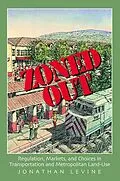Researchers have responded to urban sprawl, congestion, and pollution by assessing alternatives such as smart growth, new urbanism, and transit-oriented development. Underlying this has been the presumption that, for these options to be given serious consideration as part of policy reform, science has to prove that they will reduce auto use and increase transit, walking, and other physical activity. Zoned Out forcefully argues that the debate about transportation and land-use planning in the United States has been distorted by a myth?the myth that urban sprawl is the result of a free market. According to this myth, low-density, auto-dependent development dominates U.S. metropolitan areas because that is what Americans prefer. Jonathan Levine confronts the free market myth by pointing out that land development is already one of the most regulated sectors of the U.S. economy. Noting that local governments use their regulatory powers to lower densities, segregate different types of land uses, and mandate large roadways and parking lots, he argues that the design template for urban sprawl is written into the land-use regulations of thousands of municipalities nationwide. These regulations and the skewed thinking that underlies current debate mean that policy innovation, market forces, and the compact-development alternatives they might produce are often 'zoned out' of metropolitan areas. In debunking the market myth, Levine articulates an important paradigm shift. Where people believe that current land-use development is governed by a free-market, any proposal for policy reform is seen as a market intervention and a limitation on consumer choice, and any proposal carries a high burden of scientific proof that it will be effective. By reorienting the debate, Levine shows that the burden of scientific proof that was the lynchpin of transportation and land-use debates has been misassigned, and that, far from impeding market forces or limiting consumer choice, policy reform that removes regulatory obstacles would enhance both. A groundbreaking work in urban planning, transportation and land-use policy, Zoned Out challenges a policy environment in which scientific uncertainty is used to reinforce the status quo of sprawl and its negative consequences for people and their communities.
Autorentext
Jonathan Levine is associate professor and chair of the Urban and Regional Planning Program in the A. Alfred Taubman College of Architecture and Urban Planning at the University of Michigan.
Zusammenfassung
Today, most of the 2,800 tranquil acres that make up Wye Island are managed by the Maryland Park Service. However, from 1973 to 1974, the island was the site of a raging controversy. A major developer, James Rouse, wanted to build a compact waterfront village that would be surrounded by large estates, protected farms, and wetlands. A boyhood resident of nearby Easton, Maryland, Rouse hoped that the island could avoid the sprawl of unplanned subdivisions that were marring so many other places along the Eastern Shore. Combining history, journalism, character sketches, and sharp sociological insight, Boyd Gibbons presents the conflict over Wye Island in its multiple dimensions - as an example of the emerging community-based activism of the 1960s and 70s, and of a community that, while exercising its right to preserve its identity, denies opportunities for its members to improve their lives through change. In fact, Wye Island proves not to be the environmental David-Goliath struggle that might be expected. For one thing, residents opposed a development plan that can be regarded as an early model for 'smart growth.' And many were no more favorably disposed to a park or preserve than to a planned village. Their interest was in protecting the community from an invasion of immigrants from ethnically diverse Baltimore and Washington, and, where the wealthy were concerned, protecting some very private views of the water. In the end, rich landowners, poor 'natives,' and many recent newcomers opposed the Rouse project - distrusting change, and, above all, fearing 'outsiders.' The special reprint of Wye Island includes a new foreword by distinguished environmental historian Adam Rome, who explores the enduring themes of Wye Island in context of the current debates about land use, development, and sprawl.
Inhalt
Chapter 1 MARKET FAILURES AND PLANNING FAILURES; Chapter 2 TRAVEL BEHAVIOR RESEARCH AND THE "MARKET"; Chapter 3 MARKETLIKE INTERPRETATIONS OF LAND-USE CONTROLS; Chapter 4 THE HARMS OF REGULATORY EXCLUSION; Chapter 5 IS ZONING STATE REGULATION OR A LOCAL PROPERTY RIGHT?; Chapter 6 The Limited Power of Smart-Growth Regulation; Chapter 7 Developers, Planners, and Neighborhood Supply; Chapter 8 THE DEMAND FOR TRANSPORTATION AND LAND-USE INNOVATION; Chapter 9 A NEW FOUNDATION FOR POLICY REFORM;
